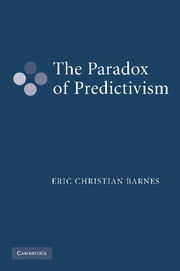Book contents
- Frontmatter
- Contents
- Acknowledgments
- Chapter 1 The paradox of predictivism
- Chapter 2 Epistemic pluralism
- Chapter 3 Predictivism and the Periodic Table of the Elements
- Chapter 4 Miracle arguments and the demise of strong predictivism
- Chapter 5 The predicting community
- Chapter 6 Back to epistemic pluralism
- Chapter 7 Postlude on old evidence
- Chapter 8 A paradox resolved
- Glossary
- Bibliography
- Index
Chapter 5 - The predicting community
Published online by Cambridge University Press: 22 September 2009
- Frontmatter
- Contents
- Acknowledgments
- Chapter 1 The paradox of predictivism
- Chapter 2 Epistemic pluralism
- Chapter 3 Predictivism and the Periodic Table of the Elements
- Chapter 4 Miracle arguments and the demise of strong predictivism
- Chapter 5 The predicting community
- Chapter 6 Back to epistemic pluralism
- Chapter 7 Postlude on old evidence
- Chapter 8 A paradox resolved
- Glossary
- Bibliography
- Index
Summary
INTRODUCTION
Jeane Dixon was one of the best known astrologers and alleged psychics of the twentieth century. Probably her most famous prediction was the assassination of John F. Kennedy. But there is a well known explanation for Dixon's ability to make astonishing correct predictions, and it is the fact that she made many more predictions that were unsuccessful but largely ignored. If one makes enough predictions, some of them are bound to turn out true by chance. The mathematician John Allen Paulos defined the “Jeane Dixon effect” as the tendency to tout successful predictions while ignoring unsuccessful ones. Clearly, the epistemic import of a successful prediction has something to do with the number of predictions on offer.
It was noted in the previous chapter that the pool of endorsements in which an endorsement of a novelly successful theory is made can affect the epistemic significance of that endorsement. The high frequency assumption claims that the rate at which novelly successful theories are endorsed is too great to be accounted for by chance – for if it were lower than this, there would be little reason to take any particular endorsement of a novelly successful theory as a result of the endorser's holding true background beliefs. Such endorsements could simply be the result of chance, i.e., false background beliefs that happened to prompt an endorsement of a theory with true novel consequences.
- Type
- Chapter
- Information
- The Paradox of Predictivism , pp. 168 - 189Publisher: Cambridge University PressPrint publication year: 2008

